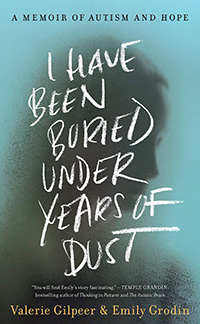 Valerie Gilpeer and Emily Grodin, I Have Been Buried Under Years of Dust: A Memoir of Autism and Hope (New York: HarperCollins, 2021), 264pp.
Valerie Gilpeer and Emily Grodin, I Have Been Buried Under Years of Dust: A Memoir of Autism and Hope (New York: HarperCollins, 2021), 264pp.
Hello readers,
For 25 years I was trapped inside a body without a voice. Through the help of my communication partner, I have learned to type. I'm now able to really express my thoughts and feelings in a way I never thought possible. The years used to pass me by and I was merely an onlooker of my own life. Now I am the one making the decisions about my life and won't ever again be silent. I'm so very grateful every single day. Please friends, do me a real favor and be open minded when you meet someone on the autism spectrum. I can guarantee that there is more to them than you can see.
Sincerely, Emily
Emily Grodin (born 1991) was close to an official diagnosis of autism by her first birthday. By the age of two, her parents Valerie Gilpeer and Tom Grodin were paying for 25 hours of private therapy every week for Emily. This mother-daughter memoir describes in excruciating detail the "very lonely battle" of a family with autism.
The memoir does two things exceptionally well. First, it helps you to understand the struggle of the parents, who were "crushed by the weight of what we carried." The social isolation; the strains on their marriage; feelings of helplessness, hopelessness, anger, defeat, humiliation, denial ("magical thinking") and chronic anxiety; the endless search for answers and explanations; the revolving door of schools to find the right spot, etc. Second, we learn what autism is like from Emily's perspective. Although most of this story is written by the mother Valerie, there are generous portions of Emily's first person narratives included throughout the book (including an entire appendix of her writings). Further, Valerie's descriptions of Emily's life with autism are painfully realistic.
A "miracle" is the word that one doctor used to describe what happened to Emily. As Emily herself recounts (above), at the age of 25, out of the blue and right after a nadir of profound failures, she learned to type on an iPad, which in turn would read aloud what she had written. The title of the memoir were some of her very first words. She would go on to write all sorts of things — answers to questions, conversations, poems, essays, letters, etc. It's clear that during those 25 long years of silence Emily had a rich interior emotional and intellectual life.
There are no false promises here, nor should there be. Emily still does not express herself verbally in fully normal ways. She types on the iPad much more readily with her helpers than with her parents. Remarkable progress thanks to a breakthrough is not a perfect fix. The family had significant financial resources that most families don't have. In some ways, as Gilpeer says, "we are still in the Dark Ages when it comes to autism." It is a mysterious and complicated disability. Finally, as Gilpeer is careful to note, every family experience is different: "If you've met one autistic person, you've met one autistic person." Each individual is a data set of one. Nonetheless, this memoir is a rich mixture of pain, hope, inspiration, and tenacity. It evokes compassion, and will be a provocative contribution to the literature on autism.
IMPORTANT NOTE: Valerie Gilpeer is a believer in what is known as "Facilitated Communication" or supported typing, which argues that autism is a physical problem and not a neurological disability. In this view the autistic person has a normal mind in a broken body that needs help to communicate. Gilpeer admits that FC is scientifically controversial and widely criticized. There is a huge literature on this debate, which many scientists argue is conclusive. I would point interested readers to the Wiki article "Facilitated Communication," the first sentence of which reads that FC is "a scientifically discredited technique that attempts to aid communication by people with autism or other communication disabilities who are non-verbal." The article includes a list of 22 organizations that oppose FC (eg, the American Academy of Child and Adolescent Psychiatry, the American Academy of Pediatrics, etc.).
Dan Clendenin: dan@journeywithjesus.net


